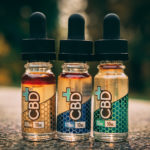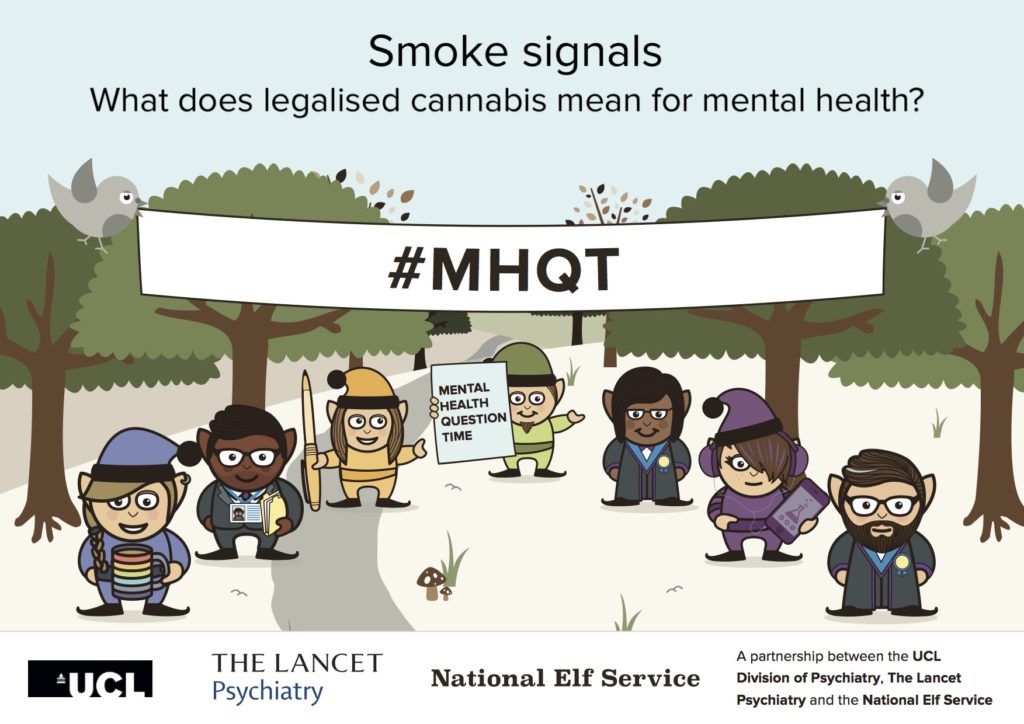
Cannabis has been used as a medicine for at least 5,000 years (Bridgeman & Abazia, 2017). But it has been prohibited in the UK since the 1920s. The recent cases of Billy Caldwell and Alfie Dingley have led to the government reviewing its policy regarding medicinal cannabis, and it has been announced recently that cannabis will be reclassified as a schedule 2 drug allowing specialist doctors to prescribe it.
Currently the evidence regarding the medical benefits of cannabis is arguably strongest for conditions like as epilepsy (O’Connell, Gloss, & Devinsky 2017), multiple sclerosis (Nielsen et al. 2018), and neuropathic pain (Mücke et al. 2018). In each case, systematic reviews report that cannabis or its derivatives appear to be better than placebo for at least some symptoms. However, evidence from large, high-quality randomised controlled trials is still lacking.
With the growing interest in the potential medical benefits of cannabis, and the new momentum towards its legalisation for medicinal purposes, its possible therapeutic use in psychiatric conditions is becoming an increasingly important topic.
Cannabis contains over 100 cannabinoids of which delta-9-tetrahydrocannabinol (THC) is the most well known. It is one of the most prevalent psychoactive compounds in cannabis, and is the main cannabinoid responsible for making people ‘high’. But a substantial and ever growing body of evidence links it to an increased risk of psychosis (Gage, Hickman, & Zammit, 2016), and there is evidence of an association with depression and other psychiatric conditions.
Cannabidiol (CBD) is a ‘non-intoxicating’ cannabinoid, and in contrast to THC it is thought to be potentially beneficial for psychosis (Zuardi et al. 2012; Fakhoury 2016), as well as anxiety, depression, sleep disorders (Rong et al. 2017), and other psychiatric conditions (Lim, See, & Lee 2017). This evidence base is still very much emerging though, and so far only a few good quality trials have been reported.
Ahead of a Mental Health Question Time on Cannabis and Mental Health on 26th September, I describe a recent study (McGuire et al. 2018) of CBD as an adjunct to antipsychotic treatment in people with schizophrenia. It’s a significant new piece of research for a number of reasons:
- So far, much of the evidence regarding the antipsychotic effects of CBD has come from studies with animals or healthy participants
- There have only been a handful of double-blind trials so far reported that have included patients with psychosis
- The others (Leweke et al. 2012, Boggs et al. 2018) featured smaller sample sizes (N=42 and N=36 respectively) and lower doses (800mg and 600mg per day respectively)
- Leweke et al. compared CBD to Amisulpride, and found both had a similar effect on psychotic symptoms but CBD had fewer side-effects
- Boggs et al. also tested CBD against placebo as an adjunct to existing antipsychotic treatment, but found no statistically significant effect after 6 weeks.

On 26th Sep 2018, Mental Health Question Time will be discussing the pros and cons of cannabis in relation to our mental health. Get your FREE tickets here!
Methods
A recent double-blinded randomised controlled trial of CBD as an adjunct treatment for psychosis (McGuire et al, 2018), randomised 88 participants to receive either 1,000 mg/day of CBD (N=43) or a placebo (N=45) alongside their existing antipsychotic treatment for 6 weeks.
Participants were assessed at baseline and treatment end. Their psychotic symptom severity was measured using the Positive and Negative Syndrome Scale (PANSS) and the Scale for the Assessment of Negative Symptoms (SANS). The impact of their illness on their day-to-day lives and their perceived improvement due to their medication were measured using the Global Assessment of Functioning (GAF) and the improvement score on the Clinical Global Impressions Scale (CGI-I). The cognitive functioning of participants was assessed using the Brief Assessment of Cognitive in Schizophrenia (BACS). Participants’ weight, waist measurement, BMI, and cholesterol levels were also taken, and along with adverse events, were used to assess the safety and tolerability of CBD.
Results
On average, participants were 40.8 (SD 11.69) years old, and 51 (58%) were male. Most participants had schizophrenia (N=83, 94%), and the others had schizoaffective disorder (N=3, 3%), schizophreniform disorder (N=1, 1%), or delusional disorder (N=1, 1%). Baseline outcome measures were similar between groups.
At treatment end, participants receiving CBD:
- Had a slight improvement in their positive psychotic symptoms (PANSS positive score difference = -1.4, 95% CI -2.5 to -0.2, p=0.02)
- Their negative symptoms showed no statistically significant improvement
- They were also more likely to be rated as improved and less severely unwell by clinicians (CGI-I treatment difference = -0.5 (95% CI = -0.8 to -0.1); CGI-S treatment difference = -0.3 (95% CI -0.5 to 0.0))
- CBD had a beneficial impact on cognition (BACS treatment difference = 1.31 (95% CI -0.1 to 2.72, p=0.07) and reduced the day-to-day impact of illness (GAF treatment difference = 3.0 (95% CI -0.4 to 6.4 p=0.08), but these results were not quite statistically significant
- CBD was well tolerated by participants, and there was no significant change in weight or cholesterol measures in either group
- Rates of adverse events were similar between CBD and placebo groups.

This RCT suggests that CBD had a beneficial, but modest impact on positive psychotic symptoms and severity of illness when delivered as an adjunctive treatment to existing antipsychotic therapy.
Conclusions
McGuire et al. found that CBD had a beneficial, but modest, impact on positive psychotic symptoms and severity of illness when delivered as an adjunctive treatment to existing antipsychotic treatment. They also reported an improvement to cognition and the impact of patients’ illness on their day-to-day lives, which although only approaching statistical significance, may suggest a possible beneficial effect. However, they found no impact on negative psychotic symptoms.
Overall, these results suggest that CBD has an antipsychotic effect in schizophrenia when delivered as an adjunct treatment. However, this effect appears to be very modest and limited to only positive psychotic symptoms.
Strengths and limitations
This study was the first double-blind RCT to be published investigating CBD as an adjunct to existing antipsychotic treatment. It is the largest trial of CBD as an antipsychotic in patients with schizophrenia so far reported. It also trialled a slightly higher daily dose than other studies (1,000 mg compared to 600-800 mg). Retention was excellent with just one withdrawal from each group, which in both cases was due to adverse symptoms. It was an international study, which recruited participants across three countries, which helps with the generalisability of the results. Overall this a high quality study that offers the best evaluation to date of the antipsychotic effect of CBD in patients. However, further and larger double-blinded trials are required to explore the replicability of these results.
Importantly, the trial included participants who were already being treated with antipsychotic medication. Therefore the beneficial effects for CBD are in addition to those from existing treatment, suggesting that CBD may be a helpful adjunct therapy to current antipsychotic medication. Evidence collected using a different study design is needed to investigate CBD as a standalone treatment.
The primary limitation with the study design was its size. It was a phase two trial of a novel medication and such trials typically include hundreds of participants. So the study should at most be taken as an indication that CBD may have an antipsychotic effect arguably meriting further research, and not clear evidence that it does.
Another concern is about the modest benefit of treatment. Notably the other trial to test CBD as an adjunct treatment found no antipsychotic effect, including on positive PANSS scores. In the present trial, positive PANSS scores improved on average by 1.4 points from a baseline score of 18.0, suggesting a very modest change. Clinician rated improvement and wellness scores showed a minimal to moderate improvement in most cases. Other outcomes were not statistically significant. As such, this trial suggests that even if CBD may have antipsychotic properties as an adjunct treatment, they are small.

This small trial is an indication that CBD may have an antipsychotic effect, but is not clear evidence that it does.
Implications for practice
This study found that CBD appears to help improve positive psychotic symptoms and patient wellness. However, this is one of the first trials in this cohort. Secondly, the benefits seen in this trial are modest while the other trial failed to find an effect, suggesting that CBD as an adjunct treatment provides at most a small benefit. This trial should be seen as providing early evidence that that CBD could be modestly beneficial as an adjunct treatment to current antipsychotic medication. However, more evidence from large, well designed trials is required before any recommendations for clinical practice can be made.

More evidence from large, well designed trials is required before any recommendations for clinical practice can be made relating to cannabidiol (CBD) for schizophrenia.
Conflicts of interest
None.
Links
Primary paper
McGuire P, Robson P, Cubala WJ, et al. Cannabidiol (CBD) as an adjunctive therapy in schizophrenia: A multicentre randomized controlled trial. Am J Psychiatry. 2018;175:225–231. [PubMed abstract]
Other references
Boggs D., Surti T., Gupta A., et al. (2018). The effects of cannabidiol (CBD) on cognition and symptoms in outpatients with chronic schizophrenia a randomized placebo controlled trial. Psychopharmacology. 235, 1923-1932. [Abstract]
Bridgeman M, Abazia D. (2017) Medicinal cannabis: History, pharmacology, and implications for the acute care setting. Pharm. Ther., 42, 180–188.
Fakhoury, M. (2016) Could cannabidiol be used as an alternative to antipsychotics? Journal of Psychiatric Research , Volume 80 , 14 – 21. [Abstract]
Gage, S. H., Hickman, M., & Zammit, S. (2016). Association Between Cannabis and Psychosis: Epidemiologic Evidence (PDF). Biological Psychiatry, 79(7), 549-556.
Lim, K., See, Y.M., Lee, J. (2017) A systematic review of the effectiveness of medical cannabis for psychiatric, movement and neurodegenerative disorders. Clin Psychopharmacol Neurosci.;15:301–312.
Mücke M, Phillips T, Radbruch L, et al. (2018) Cannabis-based medicines for chronic neuropathic pain in adults. Cochrane Database of Systematic Reviews, Issue 3. Art. No.: CD012182.
Nielsen S., Germanos R., Weier M. et al. (2018). The Use of Cannabis and Cannabinoids in Treating Symptoms of Multiple Sclerosis: a Systematic Review of Reviews. Current Neurology and Neuroscience Reports. 18: 8. [PubMed abstract]
O’Connell, B. K., Gloss, D. & Devinsky, O. (2017) Cannabinoids in treatment-resistant epilepsy: a review. Epilepsy Behav. 70, 341–348. [PubMed abstract]
Rong C, Lee Y, Carmona NE, et al. Cannabidiol in medical marijuana: research vistas and potential opportunities. Pharmacol Res. 2017;121:213–8. [PubMed abstract]
Photo credits
- Vaping 360 CC BY 2.0
- Photo by Get Budding on Unsplash
- Photo by Clint McKoy on Unsplash

[…] Is Cannabidiol (CBD) an effective antipsychotic? […]
[…] Whether cannabis or its derivatives are effective treatments for psychiatric conditions has generated a lot of interest recently. However to date, legal restrictions have largely prevented big, well-designed trials from being conducted. As a result, while in the last two years there have been several reviews published (e.g. Walsh et al. 2017; Rong et al. 2017; Lim, See, & Lee 2017; Khoury et al. 2017) synthesising the evidence base for cannabis and cannabinoids in psychiatric populations, as well as numerous opinion pieces discussing various aspects of using cannabis for medical purposes, there have been only a handful of published randomised controlled trials (RCTs). Two of these investigated the anti-psychotic effects of cannabidiol (CBD) and only included a small number of trial participants (N=88 and N=36). I covered the larger of these two RCTs in a previous Mental Elf Blog, which found only a very modest effect of CBD as an adjunct to anti-psychotic treatment. […]
[…] 6 weeks, psychotic-like experiences were reduced to a greater degree in the patients given CBD compared to placebo. Not only that, but their clinicians rated this group […]
That’s incredible that it’s been used for 5,000 years and is just coming to the forefront of healthcare!
Do you know of any psychiatrists that can prescribe and/or monitor a patient with schizophrenia in Canada?
Although these studies give medication resistant patients some hope, I don’t think that CBD in these large doses are available for public consumption. Most have only 15mg per dose and therefore, the public can’t even experiment with the CBD therapeutic doses.
How can I get my son on the cbd trial ,he suffers from schizophrenia and the drugs he is on clozapine and the side effects are terrible thank you
hi,
my son is currently on Aripiprazole and the side effects are bad he is only 25 and walks around like an old man, did you get your son onto the cbd trail ?
HI Julie and Michelle, my Son is 25 and dr prescribed him an anti psychotic however my son would prefer CBD oil . what are your experiences ?